More about: 5 Days in Rome
Four days in Rome is the perfect time to see all its main monuments and squares, but it will also give you time to discover its most curious hidden corners. Here is the perfect itinerary to spend four days in Rome and not miss any of its must-see places.
Day 1: Get to know Ancient Rome
On your first day in Rome you will see the most monumental sights of the city, the impressive buildings that have been preserved since ancient times, and take a stroll through the Jewish Quarter, one of the most interesting in Europe.
Start the morning with a visit to the Colosseum
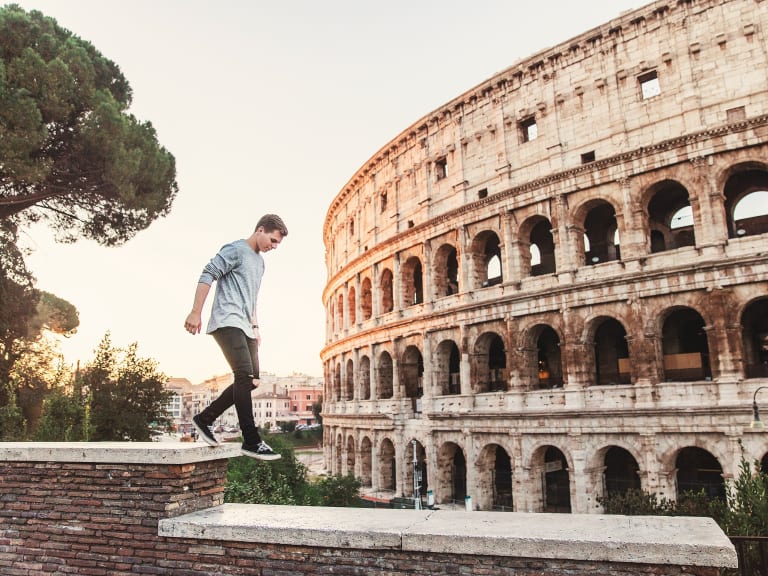
What better way to start your trip to Rome than to visit the Colosseum, one of the seven wonders of the world?
Inside the Colosseum you will see Ancient History at its purest: the most important place of Roman public life in the time of the Empire, where free citizens exercised their right to entertain themselves, something that today seems even ahead of its time.
To avoid the queues that form at the building, I recommend that you buy your tickets for the Colosseum, the Roman Forum and the Palatine Hill online. And, if you are particularly passionate about history, it might be a good idea to take a guided tour of the Colosseum that also includes the Roman Forum and the Palatine Hill.
Continue on to the Roman Forum and Palatine Hill
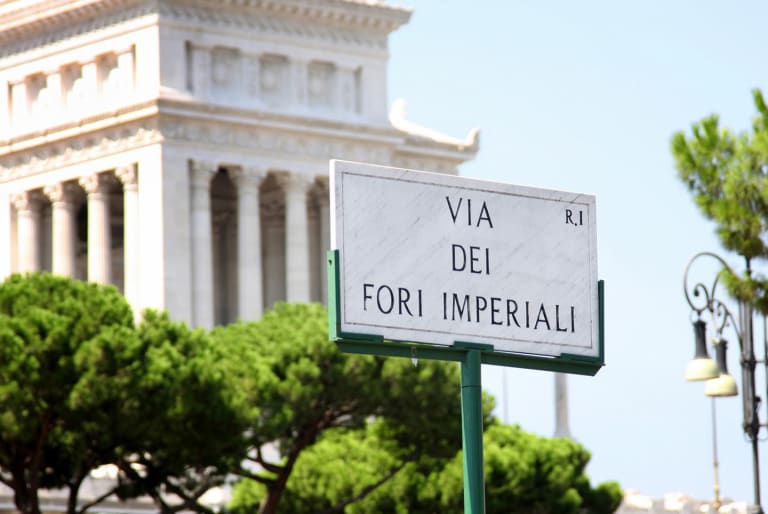
This site, very close to the Colosseum, is an open-air museum of Ancient Roman ruins. From senate houses to public squares, markets and palaces, this area is an archaeological and historical treasure trove.
Don't forget to book your tickets to the Forum and Palatine Hill in advance. The Roman Forum is located on the Palatine Hill, one of Rome's seven hills, and there are two ways to enter: either through the gate next to the Colosseum, which usually has the longest queue, or through Via di San Gregorio, although this will take a bit of a detour. If you're not in a hurry, it's best to queue.
You can also take a combined tour of the Colosseum and the Roman Forum. It will be an exciting experience that will reveal all the secrets that at first glance you might not notice, but if not it is more than enough to walk around these ruins and imagine the daily life of Antiquity. If you've been left wanting to see more ruins of the Roman Empire, there are more forums in Rome where you can take a walk through history just a short distance from the Roman Forum and with free access:
- The Imperial Forum.
- The Forum of Augustus.
- The Forum of Caesar.
Afterwards, visit Piazza del Campidoglio and Piazza Venezia
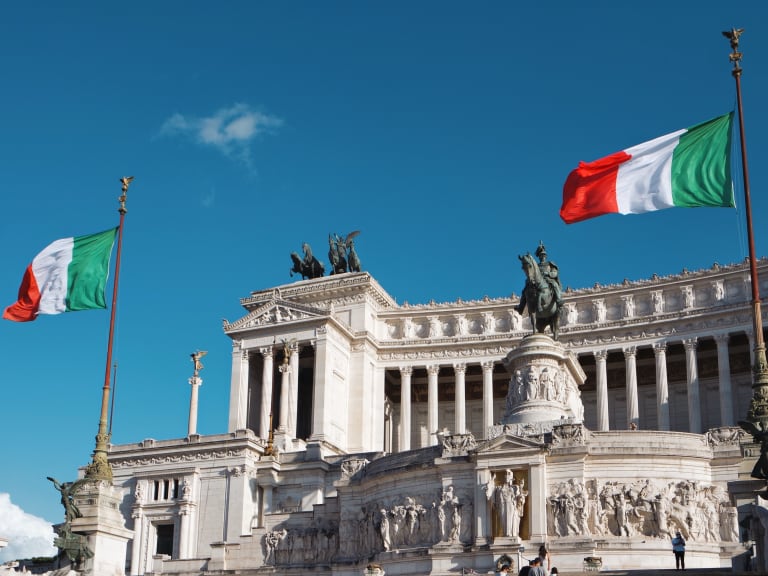
Piazza del Campidoglio is one of my favourite squares in Rome and even book a tour of Rome's fountains and squares.
Its oval shape, designed by none other than Michelangelo, and the beautiful buildings surrounding it make this square a special place to sit, relax and enjoy Rome for a while.
On your way to Piazza del Campidoglio you will pass Piazza Venezia, with the impressive national monument to Victor Emmanuel II (or Altar of the Fatherland).
Next, discover Campo de' Fiori
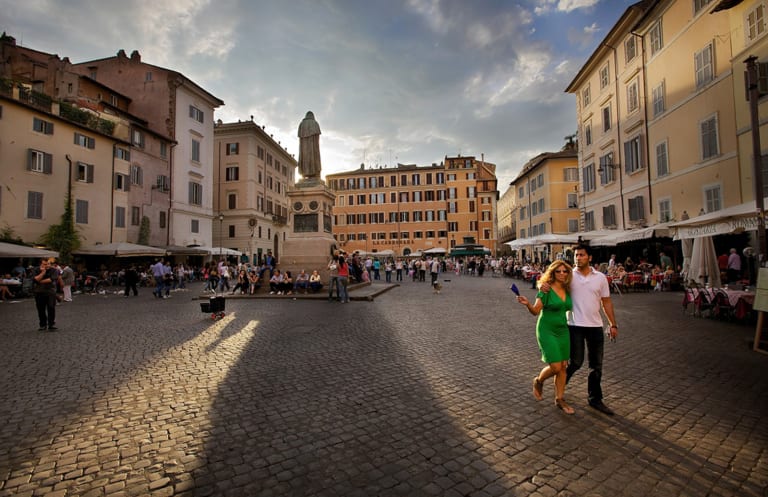
A quarter of an hour walk from Piazza del Campidoglio you will find Piazza Campo de' Fiori, very popular with tourists, where every morning except Sundays you will find a market with stalls of all kinds: food, fruit and vegetables and even bakeries.
If you are interested, you can book a tour of Rome's fountains and squares. You can also visit it if you book a food tour of Campo dei Fori
Another option is to continue to Largo di Torre Argentina and order a takeaway at Mercerie on Via di S. Nicola de' Cesarini, 5, a very trendy place in Rome where you can order some delicious stuffed baskets to take away.
Don't miss Largo di Torre Argentina
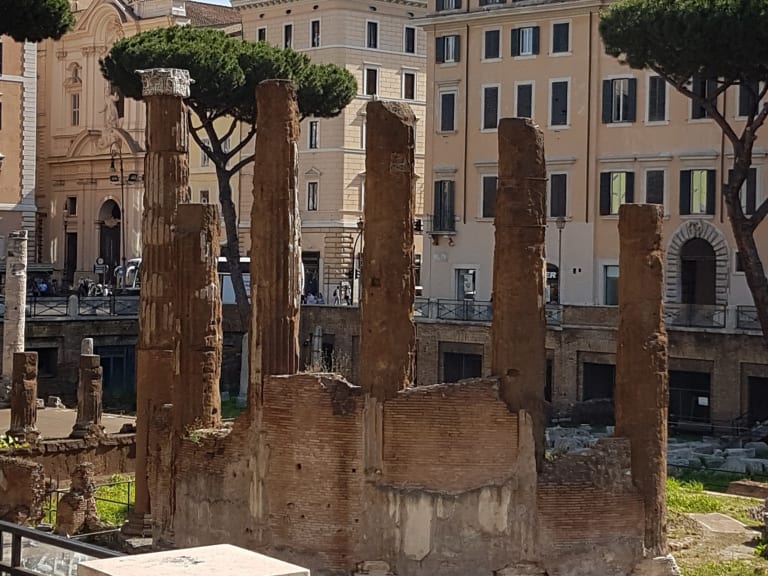
This set of ru ins is visited for two very different reasons. It is the place where Julius Caesar was assassinated, so Largo di Torre Argentina is a top attraction for history buffs, but it is also a haven for stray cats, so if you love cats you have to come here.
The ruins are located outdoors in the middle of a square and are the remains of several temples from ancient times, as well as what remains of the Curia of Pompey, the Roman Senate, where the famous assassination of the historical figure Julius Caesar took place.
In the afternoon, enter the Jewish Quarter
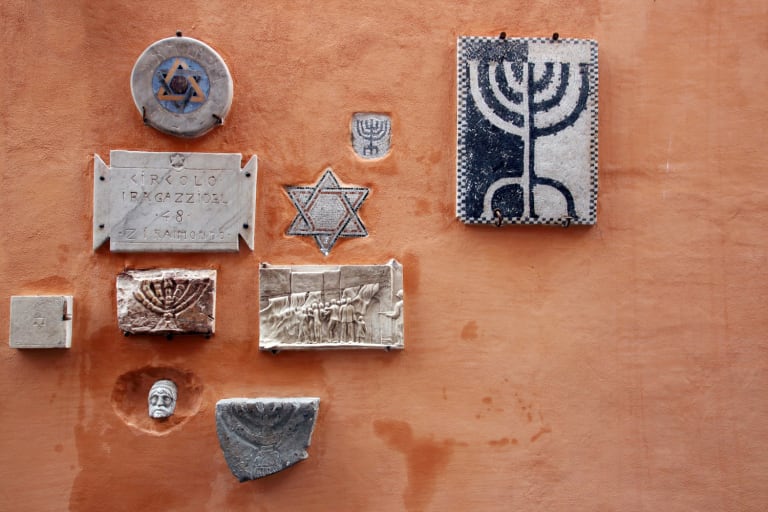
If you book a tour of the Jewish Quarter, you will enjoy a very quiet place where you can breathe a different atmosphere from the rest of the city. You will walk through its small streets and you can reach the Great Synagogue of Rome, see the Teatro Marcello, the little brother of the Colosseum, admire the historic Portico of Octavia and visit the charming Piazza Mattei with its Fountain of the Turtles.
While you are there, I recommend you try the artichokes in Jewish style, a dish of fried artichokes that is very characteristic of this neighbourhood.
And for dinner, a good place to eat, frequented by many locals, is Giggetto al Portico d'Ottavia, in Via del Portico D'Ottavia 21/a-22, where you can order the typical artichoke dish, but also some excellent pastas and meats.
Day 2: Discover the historic centre
On your second day in Rome, I recommend you to visit Piazza del Popolo, enter the Borghese Gallery, visit Piazza di Spagna, go to the Trevi Fountain and, of course, enter the Pantheon.
Visit the Piazza del Popolo
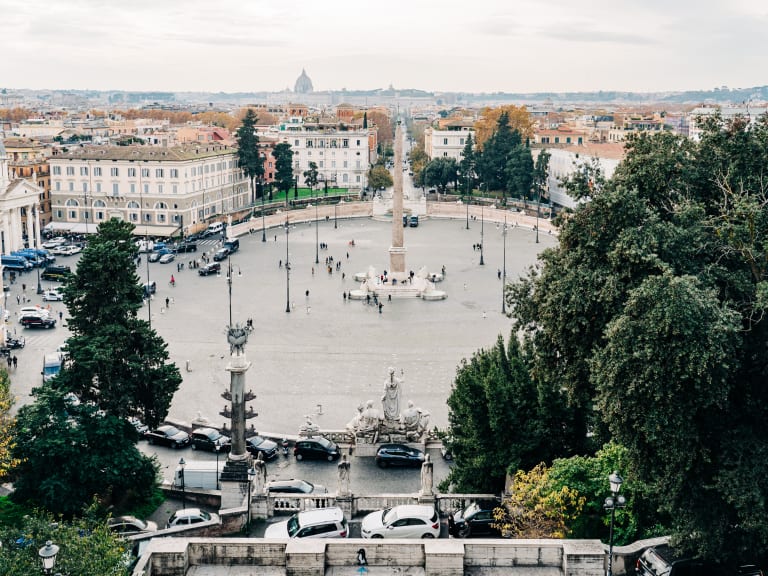
Piazza del Popolo is another of my favourite places in Rome, with the Flaminio Obelisk in the centre (originally located in the Circus Maximus)
Besides its three churches, Santa Maria dei Miracoli, Santa Maria in Montesanto and the Church of Santa Maria del Popolo, all of which are worth at least entering, next to Piazza del Popolo is the Pincio Terrace where you can climb up for a nice view of the square and Rome.
Dazzle yourself at the Borghese Gallery
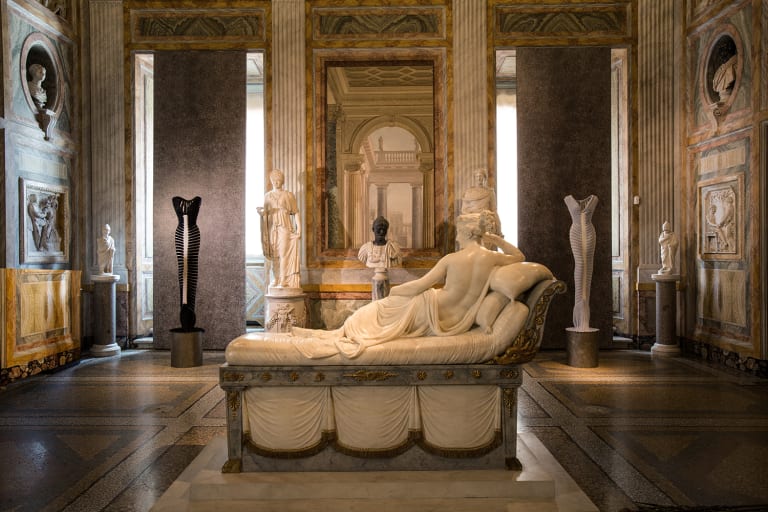
From the Piazza del Popolo you are just a short walk through the Borghese Gardens to the art gallery of the same name, the Borghese Gallery, which houses one of the most important collections of pictorial art in all of Italy.
Housed in a former palace, the Borghese Gallery is absolutely stunning and well worth a visit, especially if you have a passion for art. You can see paintings by Caravaggio, Raphael, and Titian, among other masters.
It's best to book your guided tour of the Borghese Gallery online to make sure you don't miss out and get the most out of your visit with an expert guide.
Go to Piazza di Spagna
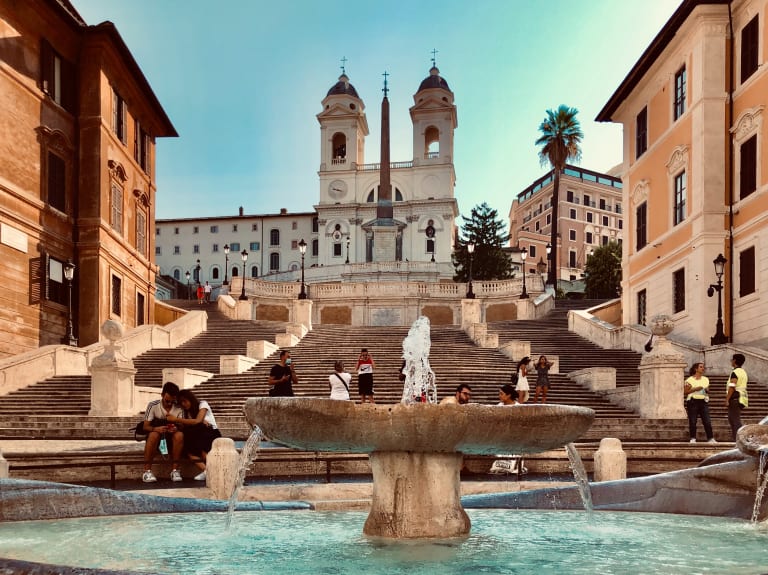
After the visit to the Borghese Gallery, the rest of the day will take you to the most emblematic places in Rome and the must-see sights of this trip.
We start with the famous Piazza di Spagna, whose staircase, full of flowers in the summer in Rome, is always full of people.
The staircase is dominated by the beautiful Church of Trinità dei Monti and in the square is the iconic Fontana della Barcaccia. This square was a place of worship for the romantic poets Keats and Percy Shelley, in fact, in the square itself is Keats' residence, now a museum. Book the fountains and squares tour of Rome and discover all the details of this emblematic place.
Take the best pictures at the Trevi Fountain
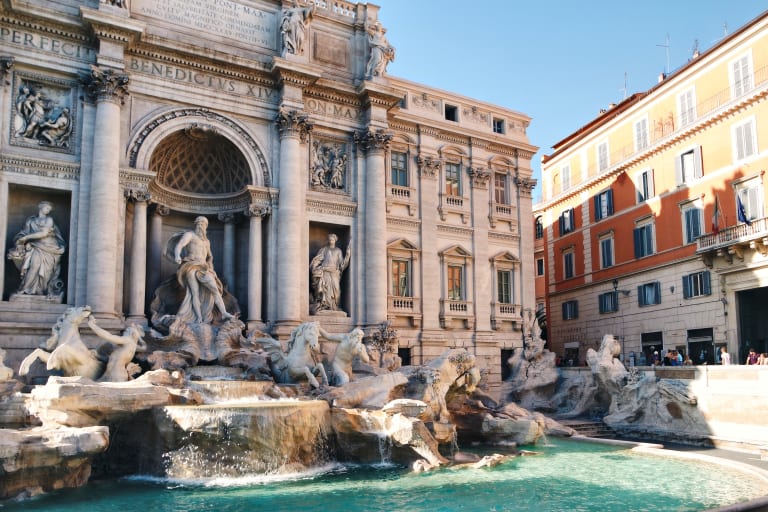
You can't leave Rome without visiting the Trevi Fountain. It is the most impressive and beautiful fountain in Rome and probably in the whole world. It has an unparalleled beauty and you can visit it if you book the tour of fountains and squares of Rome.
Whether it is for its majestic beauty, for having served as an iconic setting in 'La Dolce Vita' or for the tradition of throwing coins into the water, you will find a huge crowd of people at this fountain. So it might be a good idea to return either at dawn or after midnight, two magical times when you'll find far fewer people and can enjoy the essence of the Trevi Fountain in all its splendour.
One of Rome' s most beautiful fountains that you can't miss. If you are going to throw a coin in the water, remember the tradition: you should do it with your right hand over your left shoulder, and throw one coin to return to Rome, two coins to find love in Italy and three coins to invoke good luck in your marriage or divorce.
Start the afternoon at the Sciarra Gallery
Just a five-minute walk from the Trevi Fountain is this gallery with a small courtyard where you can see Art Nouveau frescoes and take a break from the crowds, as it's not well known to tourists.
It's one of those secret places in Rome that you'll love to discover on your trip - make a note in your diary!
Surprise yourself at the Pantheon
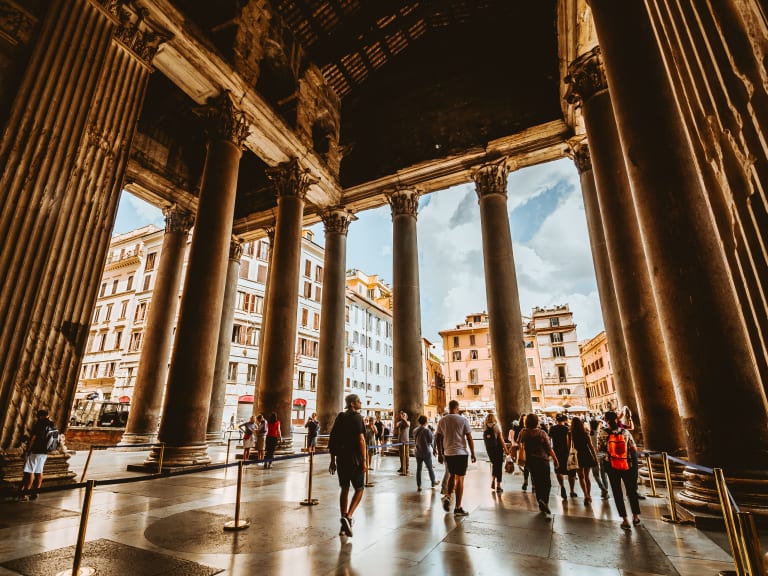
The Pantheon, now known as the church of Santa Maria Rotonda, is a place full of mystery: preserved since Antiquity, it survived the incursions of the barbarians and in the 7th century it became an important Catholic temple.
Personally, I consider it essential to book a guided tour of the Pantheon on your trip to Rome and marvel at this monument both inside and out. There is an almost magical atmosphere because of the oculus of the great dome that lets sunlight into the interior. Here, you can see the tombs of several Roman monarchs and the tomb of the artist Raphael, as well as mosaics and sculptures with a special glow.
Go to Piazza Navona
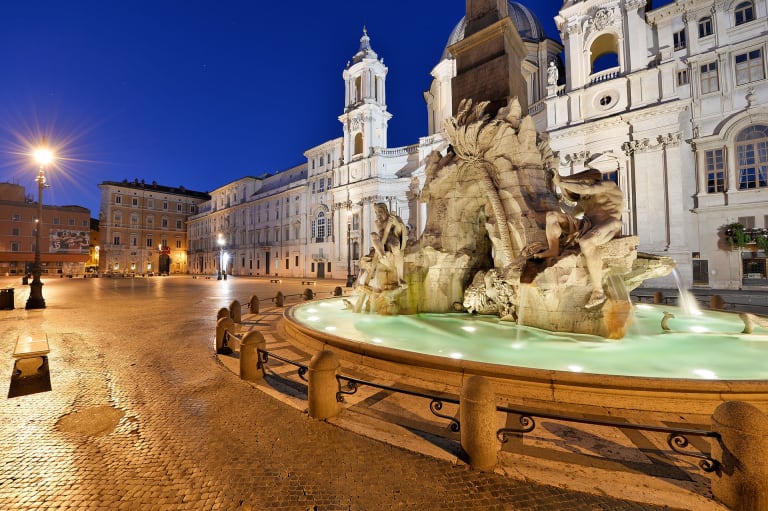
One of the most beautiful and popular squares in Rome since ancient times when this space was Domitian's stadium is Piazza Navona, an ancient place whose current beauty is largely due to the renovations of the Baroque era, which created the three fountains in the square and the church of Sant'Agnese in Agone.
It is definitely worth a visit on a four-day itinerary in Rome, where you can sit down for a coffee, relax and enjoy the atmosphere. You can also book tickets for the Piazza Navona Underground.
End the day at Castel Sant'Angelo
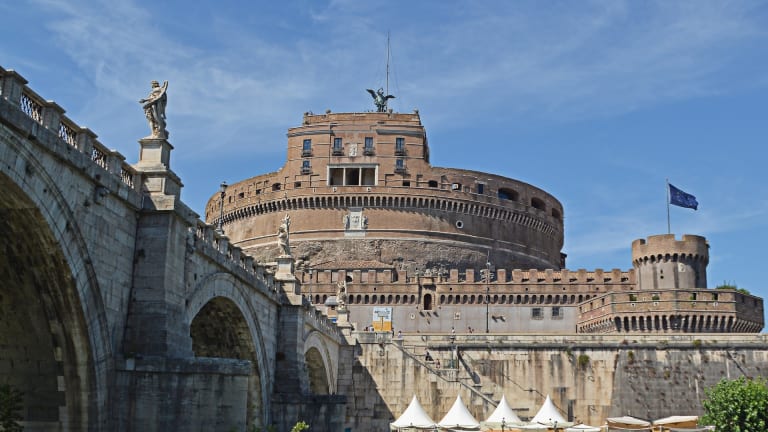
A walk from Piazza Navona to Castel Sant'Angelo will take you through the historic centre to one of Rome's most beautiful bridges.
Booking tickets for Castel Sant'Angelo is a must on your trip to Rome. Its construction dates back to the 2nd century, when Emperor Hadrian ordered Castel Sant'Angelo to be erected as a mausoleum for his family. Throughout its almost two thousand years of history, this building has served as a tomb, as a fortress for the Pope in case of attack, as a castle and, nowadays, as a museum.
You can visit Hadrian's mausoleum inside and tour the papal flats and look out over Rome from the defensive bastions, where the cannons still rest. To prepare for your visit, I recommend you read this article in which I tell you everything you need to know about the Castel Sant'Angelo in Rome: Tickets and Tours.
Day 3: Marvel at the Vatican and enjoy the afternoon in Trastevere
And for your third day, add a visit to the Vatican Museums, visit St. Peter's Basilica, stroll through Trastevere and watch the sunset from the Gianicolo viewpoint.
Start the morning at the Vatican Museums
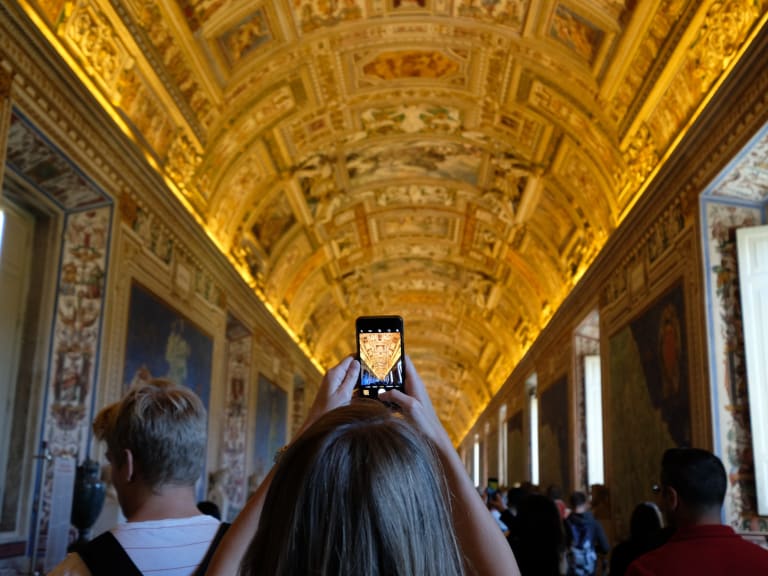
The Vatican Museums are an artistic treasure trove of gems such as the Sistine Chapel, the Hall of Maps, the Vatican Picture Gallery and many more. Forget about trying to go to the Vatican Museums without having prepared in advance:
- You will need to buy your tickets for the Vatican Museums and the Sistine Chapel without queuing up.
- I recommend you to take an early guided tour of the Vatican Museums where you will be able to enter the Vatican before it opens to the public and visit its rooms in a small group, without having to endure the masses of visitors that flock to this museum every day. You won't regret the early start when you get to the Sistine Chapel, as you'll be able to see it at your leisure.
When planning your itinerary, keep in mind that the Vatican Museums are closed on Sundays except for the last day of every month (a day I don't recommend at all, as admission is free and the queues are indescribable).
Don't miss St. Peter's Basilica
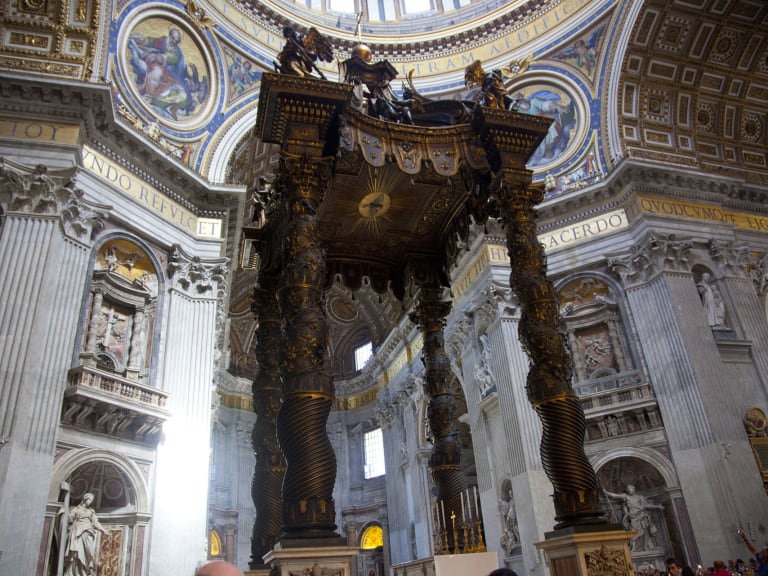
St. Peter 's Basilica is, without a doubt, the most impressive church I have seen in all my travels. Just the spectacle that rises up in front of you as you enter Piazza San Pietro is one of the most unforgettable images of your entire trip to Rome, but the inside is a work of art that you can walk around and feel, and if that wasn't enough, you can climb the dome of the basilica and admire the whole of Rome at your feet.
Entry to St Peter's Basilica is free, but you will have to queue, which is not a big problem on a four day trip. Actually, the queue moves quite fast, even if it looks like it doesn't. But why wait in line? But why wait in line? You have the option of booking a guided tour of St Peter's Basilica.
Pay special attention to the Baldacchino, Michelangelo's Pieta, the tomb of Alexander VII and the Vatican Grottoes, which is the most impressive part of St Peter's Basilica, along with the ascent to the dome, which you can see inside up close and out, with the city of Rome stretching towards the skyline as a backdrop. By the way, Wednesdays are a bad day to visit St. Peter's Basilica unless you book tickets for the papal audience.
Stroll through Trastevere
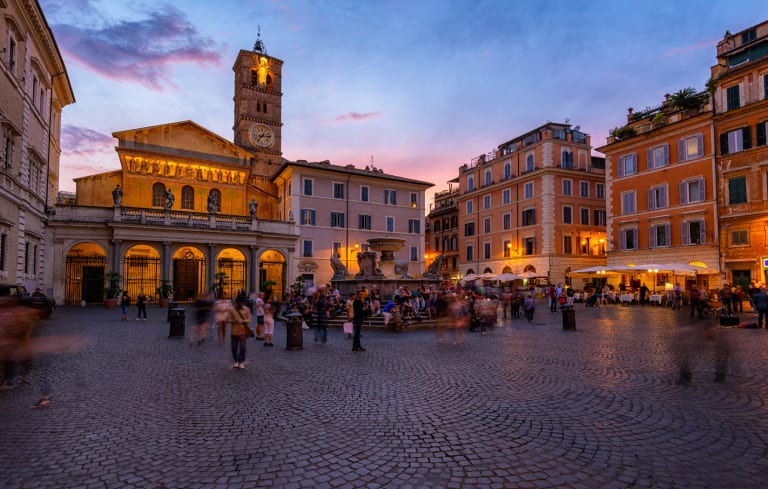
Trastévere is one of Rome' s most beautiful neighbourhoods and will give you a very authentic feeling as you walk through its cobblestone streets. Here you will find the typical shuttered windows, colourful buildings and vines hanging from every corner.
Stroll along the Tiber to Isola Tiberina and discover its surroundings, stroll through the charming Piazza di Santa Maria and enter the Basilica di Santa Maria in Trastevere to admire its golden mosaics, one of Rome' s most striking churches.
From Villa Farnesina, it's a 20-minute walk to Piazza di Santa Maria in Trastevere. Book a tour of Trastevere and get to know Rome's most peculiar neighbourhood in depth.
Don't miss the sunset from the Gianicolo viewpoint
To end the day, you have the option of relaxing with a glass of wine and a slice of pizza in Trastevere (for this I recommend you try the delicious pizza of Ai Marmi, in Viale di Trastevere, 53-59). Or...you can climb the Janiculum to enjoy the sunset over Rome, a 15-minute walk from Piazza di Santa Maria in Trastevere.
Take some snacks and drinks with you and sit on a bench to enjoy the view and the cool evening air. You can always return to Trastevere afterwards and enjoy the rest of the evening.
Day 4: Visit Testaccio and a hidden part of Rome

On your last day in Rome, you can't miss some of the Italian capital's landmarks such as the Pyramid of Gaius Cestius, the pagan cemetery, the Testaccio Market, Piazza Testaccio, the Orange Garden, the Lock of the Knights of Malta and a must-see, the Circus Maximus.
Start the day at the Pyramid of Caius Cestius
Would you have guessed that you can see a pyramid in Rome? Yes, and one that has been magnificently preserved since ancient times.
This is the Pyramid of Gaius Cestius, a Roman magistrate who ordered it built to house his burial chamber, in the style of the pyramids of Egypt.
You can see it just outside the Piramide metro stop, on the B line, but the best view is from the non-Catholic Cemetery of Rome, the next stop on the itinerary on your last day in Rome.
Visit the non-Catholic cemetery
This beautiful pagan cemetery is unique in the city of Rome, and it is even shocking to find such a thing in a city so relevant to Catholicism. The poets Percy Shelley and John Keats, who as you know were in love with Baroque Rome, are buried here.
It is a very peaceful place with a lovely atmosphere from where you can see the Pyramid of Caius Cestius in all its splendour. It's also a haven for stray cats, and you'll see many wandering among the gravestones in the cemetery.
Shop for souvenirs in the Testaccio Market and Piazza Testaccio
The Testaccio Market, unlike Campo de' Fiori, is much more local and authentic, so you'll find far fewer tourists who don't make it a priority on a trip to Rome.
Testaccio Market has everything from clothes, shoes and antiques stalls, and of course plenty of food stalls where I recommend you try some of **Rome'**s delicacies.
Also take a stroll through Piazza Testaccio, much less crowded than Rome's main squares, and take a break before heading to one of the city's most impressive monuments: the Circus Maximus.
Don't miss the Circus Maximus
Although this is not an essential visit on the itinerary, it's worth booking a guided tour of the Circus Maximus, especially if you're in the area. You can take the opportunity to stroll around the Circus Maximus, Rome's first stadium where the famous chariot races were held. In the area there are still some ruins of the palaces that were built around this place.
Today it is a park where you can see the remains of antiquity and imagine what the spectacles that took place here would have been like. And now that you've cleared your mind from a day full of sightseeing, get ready to discover one of the most special places in all of Rome.
Bid farewell to Rome in the Orange Garden and the Lock of the Knights of Malta
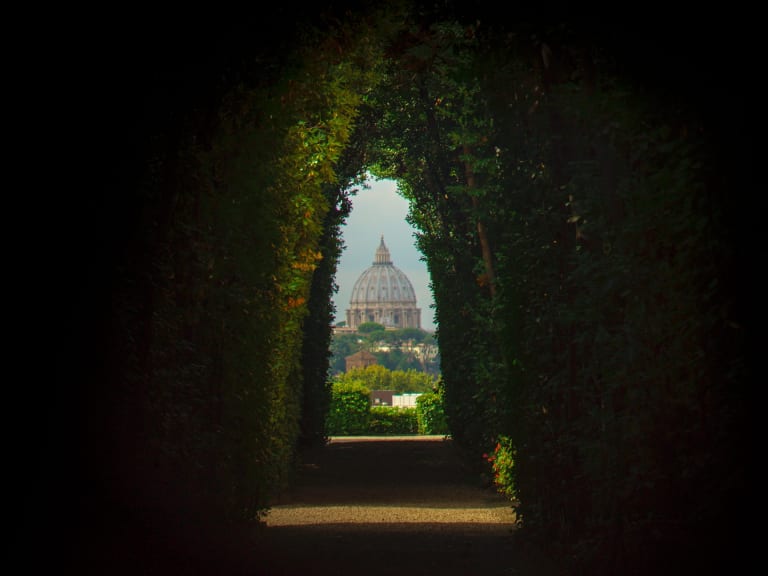
On the Aventine Hill, one of Rome's hills south of the city, there is a place called the Giardino degli Aranci, or Garden of Oranges. Originally an orchard of Dominican monks, it is now a park where you can find a door with a keyhole through which you can see the dome of St. Peter's Basilica in miniature.
It is a very beautiful and unique experience, and actually looking through the keyhole is just an excuse to stroll through the orange groves and enjoy the scent, especially on a summer afternoon.
I recommend you book the hidden Rome tour and go up here an hour before sunset, even if it means reducing the time you spend on the previous visits: it is, without a doubt, the best way to end your trip to Rome and one of the most striking and beautiful sights in Rome.




